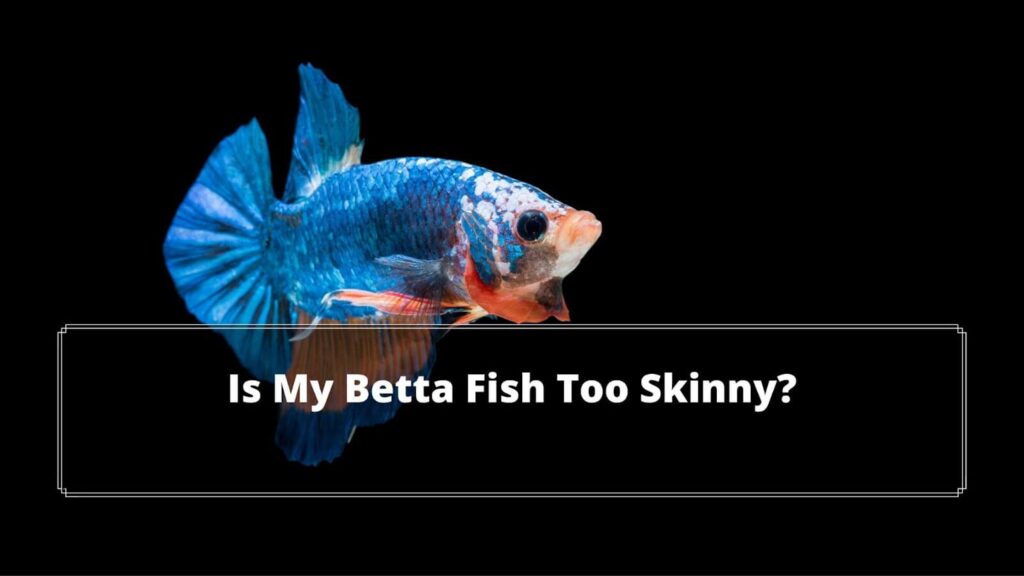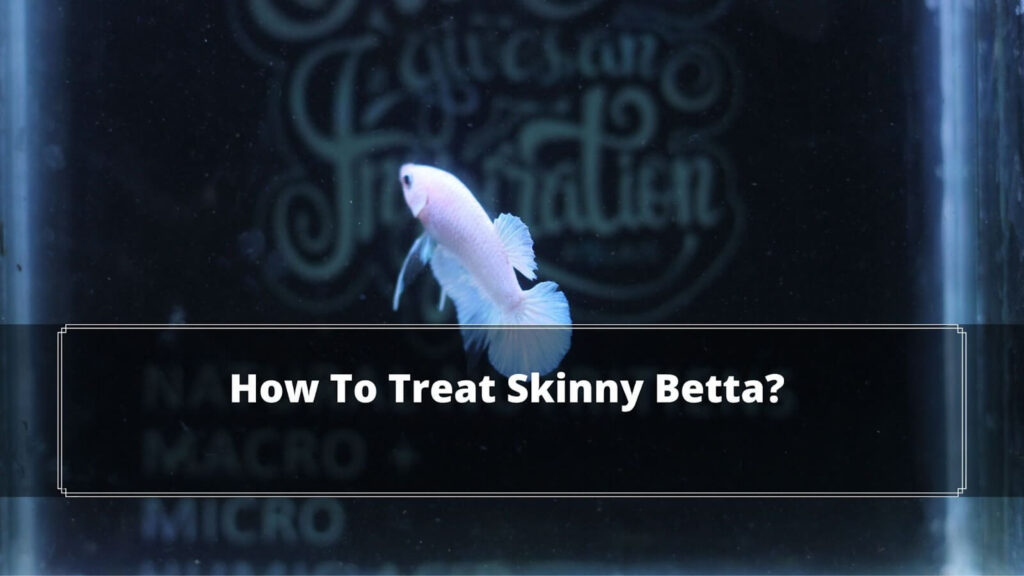Are you worried about your betta fish losing weight? Noticing a betta losing its weight makes all aquarists worried. Therefore, in this article, I will answer the most asked question: is my betta fish too skinny?
Having a betta fish tank is fun and rewarding. But at the same time, seeing a skinny betta fish can be intensely frustrating. Imagine how you get up a beautiful tank, gather all the essentials, put water and expensive equipment inside it & introduce your precious betta fish too.
For all people, it’s a surprise and mesmerizing moment when their betta fish comfortably acclimate and start swimming, dancing in the tank. But soon after, you find out one of your precious fish is suddenly looking skinny. You might be worried or confused.
Post Contents
Is My Betta Fish Too Skinny?

A betta fish that loses 1/3 of its body weight is considered skinny in aquarist’s worlds. This is a severe weight loss health issue that needs veterinary treatment immediately. The most common causes of betta fish becoming skinny are malnutrition and underlying health issues. Maybe, you are not feeding enough; or an appropriate diet.
If you are getting cheap fish food, then let me tell you, cheap fish food does carry nutrients but doesn’t carry the right balance of nutrients necessary for your betta fish to thrive. With so many fish species being kept in aquariums, many aquarists fail to provide good nutrition.
Providing good nutrition according to species in a communal fish tank is challenging. Additionally, the nutritional requirements are known for only a handful of freshwater fish species.
Therefore when you are getting food for your betta fish, assuming or guessing what is suitable for your betta fish can be an unhealthy and dangerous practice, given the vast diversity of fish.
The truth is your betta fish could be too skinny due to several factors, which we will discuss later. However, get your betta fish checked at your local veterinarian as soon as possible to address it quickly.
3 Reasons Why Betta Is Too Skinny?
We understand how heartbreaking it could be to find out your betta fish is losing its weight. Maybe, you don’t know what you did or what went wrong. Therefore, before you make a hurdle, we will highlight some common reasons my betta fish are too skinny. It will help you diagnose and rectify some significant problems that make your betta fish thin.
Malnutrition
Some aquarists think that feeding varieties of fish food are one way to try to meet nutrition requirements, which is wrong. Feeding feed varieties are an excellent way to meet its nutritional requirement in a communal tank but not for a single species tank.
For betta fish, you should get the best possible diet you can find. Betta fish prefer eating a diet that is high in protein. It is always recommended to feed your betta fish 2-4 pellets twice daily, at least.
They’re known to be perfect fillers for your betta fish that expand when placed in water. Freeze-Dried and frozen fish food that is high in protein, like blood worms, brine shrimps, & sea monkeys, can be fed as a special treat.
Loss of protein tends to be the primary cause of betta fish becoming too skinny. Protein is vital for a betta fish for many body functions, muscle growth, and repair.
Not only will malnutrition make your betta fish too skinny, but it also hosts other health-related issues like organ failure and blindness. It is essential to ensure your betta fish has eaten enough.
Overcrowded Tank
If you have an overcrowded tank, one of your fish can look too skinny due to being unable to eat enough. Most aggressive fish species tend to dominate and eat other fish foods. One of your betta fish could be vulnerable and suffering from stress due to being in an Overcrowded tank and unable to eat enough. Overcrowding will cause extreme stress reactions in your betta fish, like stunted growth, lower immunity, and prone to many other diseases. It is recommended to rehome your skinny fish ASAP or buy a larger tank.
Parasites & Infection
Just like us, betta fish also get diseases. They can be affected by viruses, protozoa, bacteria, parasites, and other conditions that cause microorganisms. Thus microorganisms can cause several elements in your betta fish’s body. Betta fishes are tiny creatures with primitive and small brains.
Therefore, your betta fish could be mistaking underlying health issues with an appetite-related problem and rejecting food without knowing the reason.
Betta fish infected with parasites or disease-causing microorganisms often stay in corners, hiding spots, or decorations. They don’t like moving their body for a longer duration. Some diseases that can cause your betta fish not to eat are included:
- Ich
- Waste Buildup In Their Stomach
- Dropsy
- Flukes
- Swim Bladder Disease
- Infection
- Impaction
How To Treat Skinny Betta?

Food plays a vital role in betta fish growth. Usually, high protein flake and palate food are preferred for betta fish by many veterinarians. The number of times you need to feed your betta fish for weight gain depends on their size also. Suppose you notice them ½-1 inch long only, feet 5 times a day at least. If your betta fish is between 1-3 inches long, consider feeding 3-4 times a day.
It is also important to consider feeding additional nutrition-rich food sources like bloodworms and Artemia. However, boil them first and scatter small pieces of food across the aquarium. If your betta fishes are young, consider feeding them every two hours.
Always keep water parameters maintained according to your betta fish need. Another essential factor to consider is the quantity of water in their tank. Having at least 65 gallons of water for 6-8 bettas is necessary. If you have a smaller tank, 5 gallons, consider keeping a betta fish in at least 10-gallon time.
A 10-gallon tank is suitable for keeping two betta fishes but not more than that. Make sure to maintain a tank temperature between 72-80 degrees Fahrenheit. The feed you are feeding to your betta fish should be high in protein and fiber.
From my experience, last quantities of high protein live food are considered to be excellent for quick weight gain. Do avoid making any big water change without checking the water parameters. If you want, you can consult your local veterinarian and take advice.
If the skinny one is female, I would consider removing the males from the tank and separating it. You can upgrade your tank size, but only when the tank is smaller than 5 gallons. Brine shrimps are nutritious and the best feed for bettas to gain weight faster.
These methods are easy to follow to make your betta fish gain weight quickly. As bettas live for only 2-4 years, being a responsible aquarist, you should give him proper diet and care.
FAQ
How Fat Should A Betta Fish Be?
The bettas gradually tapered from head to tail with the torpedo shape are considered healthy fish. But if a fish’s belly is poking out beyond its head circumference, it is overweight.
What Does A Healthy Betta Look Like?
A healthy Betta fish will have an excellent, bright, vibrant color, flowing fins, healthy body condition, structure, and gradual tapering from head to tail. If it is sick, its color will appear faded and dull.
How Do You Know If Your Betta Fish Is Too Thin?
Betta, which has lost 1/3 of its body weight with a prominent shoulder leading to a small middle, is considered too thin.
Conclusion
Skinny bettas that are eaten are usually inflicted with an internal parasite. Other than this, your bettas could be too thin because they’re not getting enough food or in stress for a prolonged period.
Feeding a high-quality protein-rich diet is necessary to cure malnutrition. First, you should check your local veterinarian immediately or call a helpline. I tried my best to give you all the reasons why is my betta fish too skinny.
If you find this post article, then share it. Your one share will motivate and appreciate us to write more about betta fish care. Do check our other article, till then take care and goodbye.Is My Betta Fish Too Skinny?

94% of pet owners say their animal pal makes them smile more than once a day. In 2007, I realized that I was made for saving Animals. My father is a Vet, and I think every pet deserves one. I started this blog, “InPetCare”, in 2019 with my father to enlighten a wider audience.
